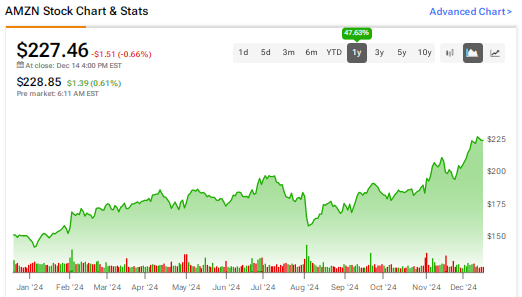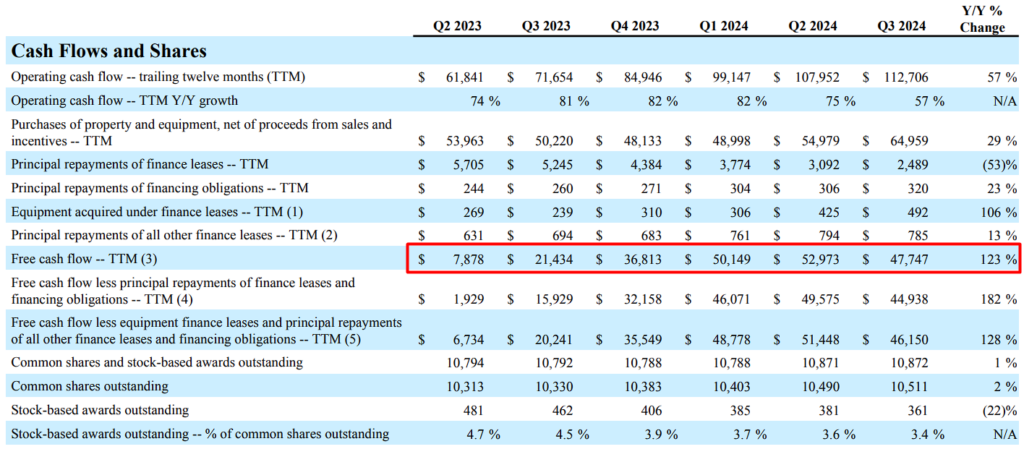Amazon stock (AMZN) has surged by about 48% over the past year, yet its momentum shows no signs of slowing. This e-commerce and cloud computing titan continues to benefit from multiple catalysts that have not only driven its recent gains but also positioned it for sustained growth. Some key drivers that stand out include notable progress in AI and operational improvements in e-commerce and advertising. Moreover, Amazon’s transformation into a free cash flow powerhouse further sweetens its investment case, all while the stock’s valuation remains reasonable. Consequently, I am bullish on Amazon stock.
Stay Ahead of the Market:
- Discover outperforming stocks and invest smarter with Top Smart Score Stocks
- Filter, analyze, and streamline your search for investment opportunities using Tipranks' Stock Screener

AI and AWS Expansion Fuel Long-Term Growth Prospects
Amazon Web Services (AWS), the company’s cloud business, demonstrated impressive momentum in Q3, achieving a 19% year-over-year growth and a $110 billion annualized revenue run rate. As a reminder, this success stemmed from increased cloud adoption and new generative AI offerings. Since then, AWS has enhanced its AI offerings by launching new models through Amazon Bedrock and SageMaker, like Anthropic’s upgraded Claude 3.5 Sonnet and Meta’s Llama 3.2.
In my view, these developments underscore AWS’ ability to address its customers’ complex needs while propping its leadership in cloud-based AI solutions. On top of that, in late November, Amazon disclosed an additional $4 billion investment in AI startup Anthropic, bringing its total investment to $8 billion. This partnership is focused on advancing generative AI capabilities, with Anthropic using AWS as its primary cloud provider and integrating its AI models into Amazon’s offerings. It’s a strategic move that I believe will further supplement what AWS brings to the table.
In the meantime, AWS’ development of custom silicon, like the Trainium chips, should help improve its price-performance capabilities for AI workloads. If you think about it, generative AI was already a huge growth driver in Q3 and is only seeing demand accelerate. That’s why I believe Amazon’s progress in this area not only tackles the needs of cost-conscious customers (who are dealing with skyrocketing CAPEX) but also makes it even more attractive to hyperscalers. What I find especially impressive is that despite all this progress—which you’d think would come with big spending—AWS has managed to stay focused on cost efficiency, as shown by the 38.1% operating margin it reported in Q3.
AMZN is Strengthening E-Commerce and Advertising Operations
Shifting years, Amazon’s e-commerce segment has also been firing on all cylinders. In Q3, net sales grew 11% year-over-year to $158.9 billion, driven by notable operational improvements. For instance, Amazon improved inventory distribution by 25% and reduced fulfillment center processing time by another 25%. Impressive, right? But here’s what I find even more thrilling: since Q3, Amazon has doubled down on its fulfillment strategy by expanding its same-day delivery facilities. So, it makes sense to expect improved customer satisfaction by delivering orders faster and more efficiently.
Coming to advertising, Amazon’s often-overlooked growth engine, the business is thriving, and like its other businesses, ongoing advancements are poised to drive continued success. The business achieved $14.3 billion in revenue during Q3, marking an exciting 18.8% year-over-year growth, with its momentum showing strong signs of sustainability.
Specifically, Amazon recently introduced new AI-powered tools to boost ad performance, such as breakthroughs in video ad generation and wider Prime Video advertising slots. Considering these catalysts and its rapidly growing customer base, I don’t believe the advertising business will show any signs of slowing down anytime soon.
AMZN’s Free Cash Flow Surge Solidifies Investment Thesis
Besides the developments I just outlined, which have certainly contributed to Amazon’s recent share price gains, I think that the most concrete aspect of Amazon’s bullish narrative is its transformation into a free cash flow machine. Over the trailing 12 months, free cash flow has soared by 123% to $47.7 billion—a rather staggering figure. This has been driven by a sharper focus on efficiency across fulfillment and data centers and more controlled capital expenditures.

But what’s even more compelling, and a clear sign of Amazon’s sustained momentum, is Wall Street’s outlook. Analysts are forecasting outstanding free cash flow growth, with projections reaching $65 billion by 2025 and over $92 billion by 2026. However, the story doesn’t end there. Despite Amazon’s strong rally this year, its valuation still appears reasonable. Trading at 26 times its projected 2026 free cash flow, Amazon’s stock is likely well-positioned for further upside. Consequently, for me, it’s hard not to stay bullish when the numbers—and the trends—are this compelling.
Is AMZN Stock a Buy?
Despite Amazon hitting new all-time highs by the day lately, Wall Street retains a Strong Buy consensus rating on the stock. This is based on 46 Buys and one Hold assigned in the past three months. At $241.75, the average Amazon stock price target suggests a 6.3% upside potential.
If you’re unsure which analyst to follow for trading AMZN stock, take a look at Rob Sanderson from Loop Capital Markets. Over the past year, the analyst has delivered an impressive average return of 34.7% per AMZN stock recommendation, with a remarkable 94% success rate.

Conclusion
In conclusion, considering the recent events, I believe that Amazon’s ability to remain innovative across AI, cloud computing, e-commerce, and advertising stresses its status as a forward-thinking market leader. Its operational discipline and commitment to efficiency have driven impressive financial growth, including a significant surge in free cash flow. And yet, the stock’s valuation remains somewhat attractive, signaling further upside potential. As a result, I continue to view Amazon as a solid long-term investment.









